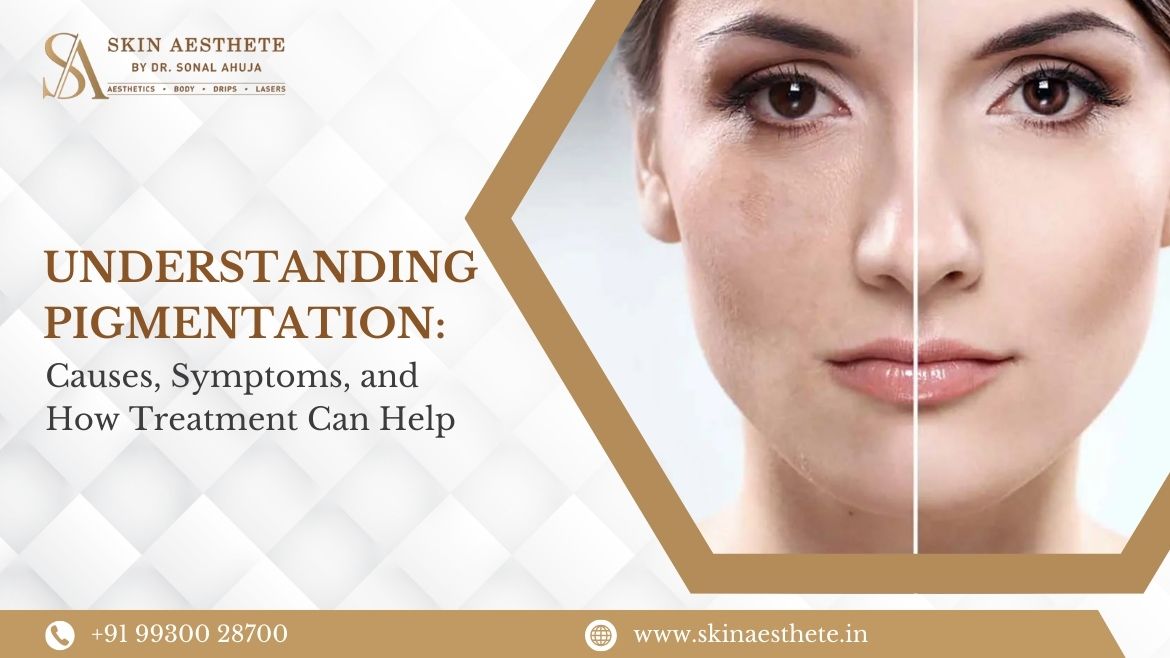




Ever noticed dark patches, uneven skin tone, or spots that seem to appear out of nowhere? That’s pigmentation—something many of us experience but don’t fully understand. While it’s usually harmless, pigmentation can sometimes feel frustrating, especially when it affects our confidence. The good news? There are ways to manage it effectively! Let’s break it down in simple terms.
Pigmentation refers to the coloring of your skin, which is determined by melanin—a natural pigment produced by special skin cells called melanocytes. When these cells produce too much or too little melanin, it leads to uneven skin tone, dark spots, or patches.
There are different types of pigmentation concerns, including:
Hyperpigmentation: When the skin produces too much melanin, causing dark spots or patches. This includes conditions like melasma, sun spots, and post-inflammatory hyperpigmentation (PIH).
Hypopigmentation: When melanin production decreases, leading to lighter patches on the skin. This can happen due to injuries, infections, or skin conditions like vitiligo.
Understanding what triggers pigmentation can help you take preventive steps. Some common causes include:
1. Sun Exposure
The sun is one of the biggest villains when it comes to pigmentation. UV rays stimulate melanin production, which can lead to sunspots and uneven skin tone over time. Wearing sunscreen daily is your best defense.2. Hormonal Changes
Pregnancy, birth control pills, and hormonal changes can trigger conditions like melasma, which causes brown or grayish patches on the skin, especially on the face.3. Skin Inflammation and Injuries
Ever had a pimple that left a dark mark behind and stayed longer than it should have? That’s post-inflammatory hyperpigmentation. Cuts, burns, and even harsh skincare treatments can lead to darkened patches.4. Genetics
Sometimes, pigmentation runs in families. If your parents have pigmentation issues, you might be more prone to developing them as well.5. Aging
As we age, our skin's ability to repair itself slows down, leading to age spots, uneven tone, and dullness.Pigmentation doesn’t always show up the same way for everyone. Some signs to look out for include:
- Dark or light patches on the skin
- Uneven skin tone - Spots that get darker with sun exposure - Discoloration that appears on the face, hands, or other exposed areasIf you notice sudden or severe pigmentation changes, it’s always a good idea to consult a dermatologist.
The right treatment can help lighten pigmentation, even out skin tone, and give your skin a natural glow. Here are some common ways pigmentation can be managed:
1. Sun Protection
Sunscreen is your best friend when it comes to preventing and managing pigmentation. Look for a broad-spectrum sunscreen with at least SPF 30 or higher, which would be better, and wear it daily—even on cloudy days!2. Professional Treatments
Dermatologists offer various treatments to help with pigmentation, including:Chemical Peels: These remove the top layer of the skin, revealing a fresher, more even complexion.
Laser Therapy: Targets and breaks down pigmentation, helping to fade dark spots over time.
Microdermabrasion: It helps to improve texture and tone by exfoliating the skin and boosting cell turnover.
3. Topical Treatments
Certain skincare products recommended by dermatologists can help reduce pigmentation. Ingredients like vitamin C, niacinamide, and licorice extract are known for their brightening properties.4. Lifestyle Changes
Simple habits like drinking plenty of water to stay hydrated, eating a nutrient-rich diet, and following a good sleep cycle can improve overall skin health and help with pigmentation concerns.Pigmentation is common, and while it can be persistent, it’s not something you have to live with forever. You can regain an even and radiant skin tone with the right skincare routine, sun protection, and professional treatments.
If you are looking for one of the best pigmentation treatment doctors in Navi Mumbai, then Skin Asthete is a trusted place to go with an experienced and skilled dermatologist.